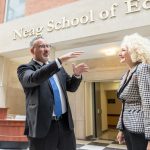Throughout the academic year, the Neag School is proud to share the latest achievements of its faculty, staff, students, and alumni. Explore their most recent promotions, awards, retirements, publications, and more.
Hoeft also created the “B.R.A.I.N. Camp” reading intervention program with Devin Kearns, a professor of educational psychology in the Neag School of Education; and the highly successful “Ask a Brain Scientist” online series of hands-on science classwork used by hundreds of children registered from around Connecticut and elsewhere in the U.S.
The Aditya Birla Education Academy (ABEA), one of India’s leading teacher training institutes under the aegis of the Aditya Birla Education Trust (ABET), and The Renzulli Center for Creativity, Gifted Education, and Talent Development (University of Connecticut), one of the leading centers in the world in the area of gifted education and talent development, have announced a collaboration to offer the Schoolwide Enrichment Program to Indian educators.
The five-minute video Denoya’s students watch is part of a series produced through a new pilot program called Feel Your Best Self, or FYBS. Each video is built around a simple strategy to help kids recognize and manage their feelings – or to help friends who are struggling.
“It’s taking what we know works,” says Emily Iovino, a trained school psychologist who is part of the FYBS team.
In this forum, Feel Your Best Self creators Sandy Chafouleas and Emily Wicks and script writers Yanniv Frank, Emily Iovino, and Sarah Nolen talk about the development of this unique interdisciplinary collaboration between UConn’s Collaboratory on School and Child Health and Ballard Institute to use puppetry to promote emotional well-being in elementary-aged children.
This past Sunday, Nov. 6, University of Connecticut undergraduate student Brianna Alexis Chance showcased her documentary series, “Housing (In)justice,” to the public for the first time. Held at the Dodd Center, the series focused on the issue of housing insecurity and homelessness within the undergraduate population. Programs were handed out before the screening for further details and information about housing insecurity, as well as the individuals who were involved in the documentary process. The production of Chance’s documentary was ultimately made possible by funding from the BOLD Women’s Leadership Network.
Due to culture, generational trauma, and expectations in relation to mental health, it is difficult for Asian Americans to reach out for help even when needed. Mental health tends to be a taboo topic within the community. Past generations have experienced traumatic historical events such as the Tiananmen Square Massacre, The EDSA Revolution, The Vietnam War, surviving poverty, and on top of that, migrating to a new country.
The tailgate, organized by CEA Communications staff and sponsored by California Casualty, included an all-you-can-eat hot breakfast for CEA members and guests, along with music, a fan photo booth, and games of cornhole, football toss, can jam, and ladder golf. Teachers were also treated to dozens of prizes that included CEA Member Benefits and UConn Neag School of Education swag, as well as raffle prizes donated by UConn, The Bushnell, and other CEA Member Benefits partners.
Chafouleas and her colleagues developed their Feel Your Best Self program to help children aged 3-12 years improve ways of relating to others as they return to the classroom post-pandemic. The program represents a partnership between Chafouleas’ group, the Collaboratory on School and Child Health, and the Ballard Institute and Museum of Puppetry, the world’s only graduate program in puppetry, both at the University of Connecticut.
A team of Neag School of Education researchers is developing a new initiative designed to help educators overcome language barriers to identify gifted students among English learners. Project EAGLE (Eliciting Advanced Gifted Learning Evidence) is one of several gifted education grants at UConn, including the National Center for Research on Gifted Education (NCRGE), that address inequity in schools.

